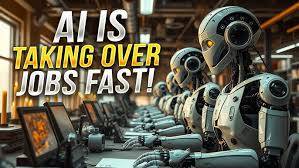Is AI Replacing Jobs More Than Expected? (A Real Talk, Not a Tech Forecast)
A few months ago, my cousin lost his job. He was working in customer service for a big e-commerce brand—one of those 24/7 support roles where you’re juggling angry emails and live chats while trying not to lose your mind. Then one day, poof. Gone. No scandal. No warning. Just a cold, generic email that basically said: “We’ve automated your position. Thanks for everything.â€
He laughed at first, like maybe it was a prank. Then he called me. “Bro,†he said, voice cracked, “I just got replaced by a bot.â€
And I didn’t know what to say. Because the scary part? He’s not the only one.
-I used to think AI was a future problem
You know, something to worry about in 10 years. Like, yeah, eventually robots would take over factories, maybe write a few scripts, maybe answer a few emails. But not today. Not right now.
But then came the real AI wave.
Not the cute Siri stuff. I’m talking ChatGPT, Gemini, Copilot—AI tools that don’t just follow rules, they create. They generate reports, code websites, design logos, write blog posts (ironic, I know), even mimic voices.
And suddenly, it wasn’t just my cousin. It was my friend who edits videos. My former coworker who writes content for brands. A girl I know who used to design social media graphics… replaced by a tool that works faster, never complains, and costs next to nothing.
-In my experience… the shift is already here
And no one really warned us. Not the way they should have.
Instead, it crept up like a sneaky app update. One minute you're working your dream job, the next minute your boss is “exploring automation solutions to increase efficiency.â€
The truth? AI is replacing jobs faster than expected.
Not in some dramatic, robots-in-suits way. But quietly. Strategically. Bit by bit.
At first, it’s just supporting roles. Then it’s streamlining. Then suddenly, it’s replacing. And by the time you realize your job's on the chopping block, the company already has three tools doing your work and your replacement doesn’t need lunch breaks.
But here’s the wild part…
A lot of us are using the very tools that could replace us.
I’ve seen writers use AI to brainstorm article titles, then wonder why freelance rates are dropping. Designers using AI to generate mockups, then surprised when clients stop calling. Even developers asking chatbots for code snippets, not realizing they’re training the system to do their job better next time.
And yeah, I get it. I use AI too. It’s fast. It’s helpful. It feels like a cheat code.
But sometimes, late at night, I wonder… am I helping it learn to replace me?
I could be wrong, but…
There’s a weird line we’re all walking. Between using AI as a tool and being used by AI as a data source. Between saving time and slowly automating ourselves into irrelevance.
It’s not doom and gloom. At least, not yet. There are still roles AI can’t touch (yet). Human nuance, empathy, intuition, weird gut feelings—that stuff’s still ours. But let’s not pretend like we’ve got decades to figure this out.
This is happening now.
Real-life example?
My friend Sarah used to proofread legal documents. Super detail-oriented. Super sharp. She was let go because her company found an AI that could scan contracts “with 90% accuracy.†Her boss told her, “We’ll still need humans for final checks,†but—spoiler—they didn’t.
Now she’s freelancing… trying to figure out how to sell “human oversight†in a world where people want cheap, fast, and automated.
So… what do we do?
I wish I had the answer. I don’t. Not really.
All I know is we have to adapt—faster than we thought. Learn new skills. Lean into the human stuff that machines still struggle with. Creativity. Strategy. Emotional intelligence. Collaboration. Ethics.
And maybe, just maybe, we start asking tougher questions:
What jobs are actually safe from AI?
How do we protect workers in this transition?
And if AI keeps doing more… what happens to all of us who aren’t part of “more�
Final thought…
AI isn’t the villain. It’s a tool. But like any tool, it depends on how it’s used—and who controls it.
So if you’re sitting there, thinking your job’s safe… maybe it is. For now.
But I’d still ask yourself this:
What part of your work can only you do?
Because that? That’s the part worth protecting.
Have you or someone you know already been replaced—or quietly pushed out—by AI? Or are you leaning into it, using it to stay ahead? Either way, let’s talk. The more we share, the less this feels like something we’re facing alone.




No comments yet
Be the first to share your thoughts!